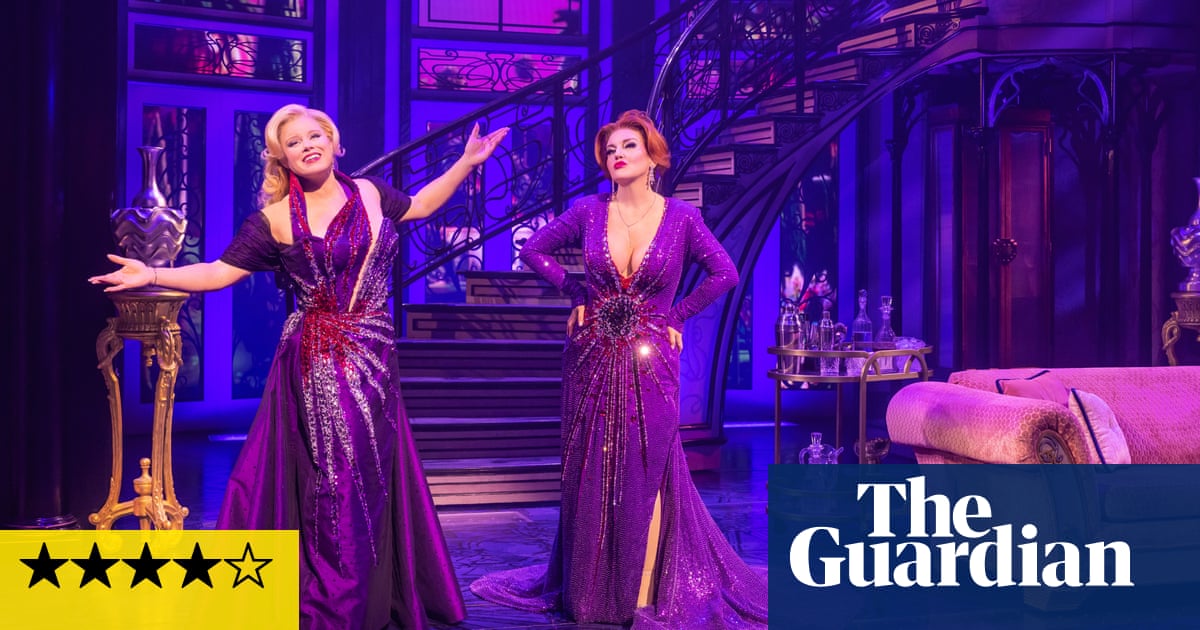Like its duelling antiheroines, Death Becomes Her refuses to die. There might not be quite the same stickiness or, unfairly, respect as that afforded to some of its 90s comedy peers but it’s lingered around the outskirts anyway, with drag tributes or Halloween costumes or comparisons to Real Housewives stars or, most recently, similarities to The Substance (it’s the infinitely better movie).
The themes, of ageing anxieties and the cruel impossibility of beauty standards, are also never going away – if anything they’ve become more centre-staged – and so some sort of reimagining has felt inevitable for a while (rumours of a remake have circulated for years). It tracks that a rebirth on Broadway would come next, with both the conveyor belt of screen-to-stage adaptations refusing to slow down and the original’s brash theatrical humour making it a perfect fit. Success was far less inevitable though given the quality of many examples that came before it, from Pretty Woman to Mrs Doubtfire to, bafflingly, Indecent Proposal.
But, after a buzzy initial run in Chicago, Death Becomes Her has been reborn on Broadway as a rousing, raucously entertaining hit, the kind of big, box-ticking blockbuster that one can see sticking around for a long time (pre-opening, ticket sales were such that it already received an extension to the end of next summer).
The plot, neatly extended from 104 to 135 minutes, follows the long-running rivalry between obnoxious stage and screen star Madeline (Broadway mainstay Megan Hilty) and her mousier writer friend Helen (Jennifer Simard). Like the film, it opens on a piss-poor musical that Madeline is headlining (renamed from Songbird to Me, Me, Me!) and the moment when Madeline then steals Helen’s easily steal-able fiance, Ernest (Christopher Sieber). It then jumps forward as Madeline’s career is as broken (she’s now selling face cream in infomercials) as her marriage. After she meets a vengeful Helen again, now frustratingly more glamorous than her, she somehow finds her way to the mysterious Viola Van Horn (Destiny’s Child’s Michelle Williams) and is made an offer she can’t refuse …
The age-defying alchemy she consumes – its purple colour is alluringly on show throughout most of the show – provides a necessary uplift, quite literally, but then sets her on a long and gory fight to the death with Helen, who has also taken the same potion, even though neither of them can die.
What made the film most notable to a wider, straighter, audience at the time was its pioneering use of CG, impressive enough to nab the film an Oscar for best visual effects. Translating both the drastic shifts in physical appearance and the many physics-defying brawls – every broken neck, bent spine and shotgunned-through stomach – on stage was never going to be easy but through a miraculous mixture of ingenious trickery and some knowingly silly choreography, it works far better than one might have feared (a ridiculously drawn-out fall down the stars and an absurd fight between two barely disguised stunt performers are both giddily dumb).
The many potholes on the road from rewatched VHS classic to tourist-securing stage musical have also been mostly avoided. For one, the numbers are more electric than they tend to be in this specific subgenre (even Tootsie, one of the more successful transfers, couldn’t muster up a single memorable song). The lyrics, from Julia Mattison and Noel Carey, are as witty and vicious as the book, from longtime TV writer Marco Pennette, and there’s a well-used recurring spin on Alan Silvestri’s glorious Elfman-adjacent score from the original. That viciousness in particular is another relief, given how defanged these things can often become. Mean Girls turned Regina George from bully to girlboss, The Bodyguard turned Rachel’s sister from villain to victim, and reports suggest that the upcoming take on The Devil Wears Prada tones down Miranda’s nastiness. There’s no such sweetening here with both women behaving awfully throughout and even when a final song threatens to melt it into a story of friendship, it’s only because these two are as deliciously unpleasant as either.
The bar was set sky high by performances in the film – Meryl Streep, Goldie Hawn, Bruce Willis and Isabella Rossellini nailing its campy, full-throated extremities without dipping into pantomime – and they’re mostly met well here. Hilty goes over the top and keeps going, with a big, booming voice that follows and while she’s the more seasoned performer and acquits herself fantastically, it’s Simard who just about steals it with a cattier yet more dialed-down tone that gives the show its funniest moments. The only letdown is Williams, whose voice is certainly powerful enough, but as an actor, she’s a little stilted, awkwardly overpronouncing lines and never as physically loose and sensual as Rossellini was or the dancers around her on stage are now.
It’s a rare bum note in an otherwise top-tier crowd-pleaser, extravagantly transformed on stage, a new lease on life more than deserved.
∎